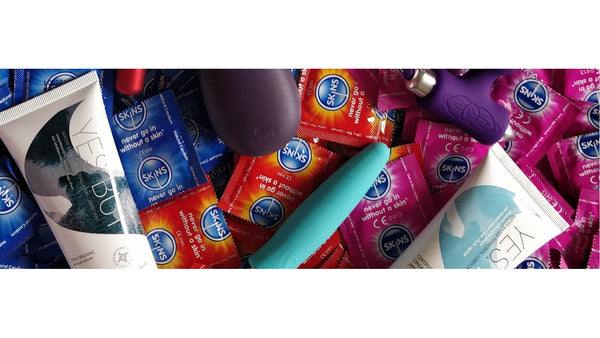Student sex

Read about the author Samantha Evans
There is a generalised assumption that when you go to university, the curriculum centres on over-indulging on sex and alcohol. While this isn’t necessary for many students, in 2014 it was reported that the dating app Tinder, renowned for casual hook-ups, found that 50% of its users were aged 18-24, and were based at university. In 2014, the Student Beans survey revealed that 51% of the of 6,129 student participants admitted to having one night stands, which could arguably be linked to this more casual approach to sex in younger people.
However , are attitudes changing among younger people? A study by the London School of Hygiene and Tropical Medicine, published in the the British Medical Journal (2019), found that regular sexual activity between couples is on the decline. Less than half of men and women in the UK aged 16-44 years old have sex at least once a week.
Does having more sex necessarily mean good sex and are younger people especially those with a vagina having less sex because they no longer will put up with bad sex? Some people today may feel less pressured into sex they don’t want to have, thanks to changing genders and growing awareness of diverse sexual orientations, including asexuality
I can’t get no satisfaction…
According to the 2015 Hexjam Student Sex Survey, with just under 6,000 participants, the highest recorded level of sexual satisfaction came from students at London South Bank University, with 80% of participants stating that they had a happy sex life. The university ranked in at 18th place for average sexual partners with 6.21.
However, 57 of the 94 universities that participated reported that less than 50% of their students were content with their sexcapades. The lowest recorded level of satisfaction was a mere 4.76% of students studying at the University of West Scotland, with an average of 3.73 partners coming in at 75th place.
Furthermore, the Student Beans study found that 57% of people with a vulva and 47% of British students with a penis regretted having sex with someone; this could be linked to the scarily high numbers of students having unprotected sex, with 51% of vulva owners and 61% of people with a penis admitting to having had sex without using contraception.
It could be argued that this means that quality of sex isn’t intrinsically linked to the amount of partners people have had: while Leeds Beckett University were top for the average number of sexual partners with 8.45 per participant, they only came in at 83 for sexual satisfaction with 27.27%.
Are younger people really having more sex?
The 2012 National Survey of Sexual Attitudes and Lifestyles found that there had been a significant drop in the amount of times 16-44 year olds were having sex, with less tha half (41%) having had sex at least once a week in the last month, predicting that by 2040 the average person won’t be having sex at all. This could explain the high numbers of younger people being unsatisfied with their sex lives!
Although a low libido is attributed to older people, the classic student lifestyle could be contributing to a lowered sex drive. Busy schedules, a lack of sleep, side effect to medication, anxiety, stress, financial worries and a poor diet can all contribute to a lack of want to have sex, but being intimate with a partner can actually lead to better health and wellbeing.
Sex and regular masturbation can reduce stress, lower your blood pressure, burn calories and improve heart health just for starters! It can also strengthen your relationship by increasing intimacy levels, lending to overall increased happiness. Now that can’t be a bad thing!
Masturbating leads to better sex
Masturbation is good for your sexual health and pleasure, it is the first step into enjoying a pleasurable, healthy sex life and discovering different sexual sensations and enjoying regular orgasms. According to TENGA 2018 Global Self-Pleasure Report not everyone masturbates or has tried masturbation.They found 87% of 18-24 year olds had masturbated, with 52% do it at least weekly, with an average 5.3 times per week. 29% do it a few times a month, 7% a few times per year, and 12% “not regularly.” Of those who masturbate, gay and bisexual individuals are 20 percent more likely to masturbate weekly than heterosexual individuals. There is no normal amount of times to masturbate, whatever feels pleasurable and comfortable for you. Knowing what works for you is a great way to show a partner too.
People masturbate for a variety of reasons including sexual pleasure, to relax, help them sleep, relieve pain, alleviate stress and to improve their performance.
Consent – Yes, No, Maybe
Consent is essential in any relationship or casual encounter so ask, do not assume they are agreeing to what you are doing or enjoying it. Remember NO means no, maybe can mean no, and they can change their mind at any point, as can you.
Launched by the Family Planning Association (FPA) Sexual Health Week (2018) was all about consent, a topic that underpins all their work on relationships, sexual health and wellbeing with the message that consent is about much more than saying “no” – it’s about giving an enthusiastic “yes”.
Their survey of 2000 people found that less than 50% thought it was ok to withdraw consent once you were naked, dropping to a worryingly 39% for young people aged 14-17. Only 13% of people said they would be most likely to discuss issues of consent with a partner and 45% of young people aged 18-24 learnt about consent from TV and film, along with 37% of those aged 14-17.
Invest in a sex toy
University is a great time to experiment sexually, and younger people need to realise the importance of communicating with a partner if something isn’t working for them. In short, stop putting up with bad sex!
Explore each other’s bodies in different ways; introducing sex toys into your sex play can be a fun way to learn about your own needs, too. Sex toys aren’t always intimidating- you don’t have to start off with the biggest sex toy you can find. Only choose skin safe sex toys, avoid jelly, latex and rubber products. Be aware of where and who you are buying them from as there are many fake and used products available online!
Using a simple bullet vibrator is a great way to enjoy orgasms alone or during couples’ play
Using a discreet toy such as the Rocks-Off R0 90mm bullet is great as it can be used during sex. The unassuming clitoral stimulator has a sleek design that means it can slip between you and your partner during sex, meaning that you can share the scintillating vibrations together! Or try the Screaming O Charged Vooom. Being rechargeable makes it environmentally friendly and you don’t need to worry about the batteries running out either.
Cock rings, also known as Love Rings, are also a great way to introduce sex toys into your sex play, and are a really diverse product. Vibrating cock rings such as the Screaming O Charged Combo provide extra clitoral stimulation and vibrations to share for steamy sessions. It offers three in one with the vibrating cock ring and a bullet vibrator, so you can use the ring with or without the bullet and the bullet with the ring or on its own.
If vibes aren’t for you there are cock rings such as the Rocks-Off Rudy Rings will make your erection bigger, harder and last longer, pleasurable for both you and your partner. Remember that constriction rings should not be worn for longer than 30 minutes. If you do experience performance anxiety it may be worth seeking psychosexual therapy.
Do not be tempted to use DIY sex toys because you may end up with a sex injury and an embarrassing visit to A&E!
Wetter is better
Lots of younger people don’t realise that they need to use lubricants. While porn and some TV shows suggest that a person with a vulva is fully aroused as soon as their takes her clothes off for sex, this is not the case! You can feel aroused but not well lubricated.
Your level of vaginal lubrication is affected by hormonal changes, side effects of medication, such as antidepressants, antihistamines, the contraceptive pill, stress and anxiety
Lubricants are often associated with older people, but they can actually make sex feel more pleasurable and last longer as a lubricant such as Yes Water Based Organic Lubricant imitates a person’s natural wetness so any discomfort should be alleviated.
Flavoured lubricants are a great addition to oral sex but avoid using them for penetration as they may cause vaginal irritation.
Do not be tempted to use an product from your kitchen cupboard or bathroom cabinet as these have not been designed for intimate use, they will disrupt vagina pH and cause irritation or even an infection. Just because a product is slippery does not it is good for your sex play!
This also applies to anal sex, many people experience anal irritation because of poor ingredients so choose an anal lubricant that is skin safe and do not use anything that has not been designed for anal play.
Use a condom!
In 2019 the Student Room, the world largest student forum, performed a study on sexual activity among students and found that more than half of sexually active students have never been tested for sexually transmitted infections, despite 63% admitting to engaging in unprotected sex.
In 2017 statistics from Public Health England (PHE) showed that a case of chlamydia or gonorrhoea is diagnosed in a young person every 4 minutes in England. They found those aged 16-24 are most at risk of contracting an STI, and over half the reported cases of gonorrhoea and chlamydia in 2016 were in those aged 16-24.
Following their online survey at Kingston University (2017), they found that 80% of their students have never been tested for an STI.
Even though sexual health services have been drastcially cut by 75% making access less easy all university campuses offer sexual health services so there is no excuse and if you do not feel comfortable having a test done in clinic you can request a home testing kit.
It’s not just STIs
HPV ( human papillomavirus) is a very common group of viruses. Some types of HPV can cause genital warts or cancer as it can be transmitted orally, anally and vaginally and sharing sex toys. Often people are not aware they have it because it usually doesn’t have any symptoms. It usually goes away without treatment, however if you notice symptoms such as gential warts seek medical advice. Although the HPV immunisation is being offered in schools to young teens aged 12-13 years people may have missed their vaccination or were never vaccinated. If you missed it you can get it for free on the NHS up until your 25th birthday and men who have sex with men (MSM) up to 45 years of age can also have it too. You can also pay privately to be immunised.
Whether enjoying oral sex on a vulva or on a penis it is important to use a condom or dental dam to protect yourself from transmission of STIs and HPV. According to Cancer Research UK 73% of oropharyngeal cancer cases in Europe are HPV-positive. Oropharyngeal, tonsil, and base of tongue cancer risk is higher in people with more past sexual partners (particularly oral sex partners), people who started having sex at a younger age, and men who have ever had sexual contact with men (base of the tongue only).
Safe sex is a big issue for many universities and students, but some people don’t realise that condoms are available in different sizes, as well as textures and flavours, to accommodate people with a penis of all proportions.
Skins condoms come in different sizes and textures too
Remember: a condom shouldn’t be too tight or too loose as this will be uncomfortable and unsafe. Getting the right fit will make sex feel so much better! Often people find they experience condom related erection problems because they are using a condom that is unsuitable for them.
Any oil based products will damage the condoms so do not feel tempted to use olive oil, baby oil, vaseline or any oil based product. Choose a water based lubricant or silicone lubricant
Some people think they are allergic to latex condoms but it is often the ingredients in the lubricant on the condom or it isn’t well lubricated and causes friction. It can also be the ingredients in the lubricant you are using too.
STIs are not worth the risk of having sex without a condom. With most universities offer free condoms via clinics or student lead organisations, what’s the excuse? It’s much more sensible to stay safe!
If you do think you may have been exposed or have had unprotected sex, get checked as some STIs have no symptoms.
STI treatment currently costs the NHS £620m a year and young people, particularly men, have been identified by the Department of Health and Social Care as an ‘at risk’ group for these types of infections. We can save the NHS so much money if we can encourage everyone to use a condom by choosing the right one for their needs.
Sex should never be painful
If you are experiencing pain during sex, anal or vaginally don’t ignore it! Painful sex is not pleasurable sex. Lack of lubrication makes sex feel painful, so use a good lube as mentioned above.
If penetration feels uncomfortable due to tightness this could be a common condition called Vaginismus, which means inserting anything vaginally, even a tampon, is painful or almost impossible.
Vaginismus can often be experienced during your first time having penetrative sex, but luckily it is a treatable condition. Seeking medical advice is strongly recommended, working with a pelvic health phsyiotherapist and psychsosexual therapist in combination with using silicone dilators, skins afe lubricants and/or a slim vibrator can really help.
Using a petite vibrator, such as Slinky Pinky, externally first will help you to relax, gradually enabling for internal use. Use plenty of lubricant to prevent further discomfort, and over time penetrative sex and sex play will be possible.
If anal sex feel painful, ensure you prepare your body by using an anal toy before any play, a good sexual lubricant and take it slowly.
Look after your Intimate Health
In recent years we have been deluged with hundreds of feminine hygiene products, vulva make up, detox sticks and bags, vagina tightening products, perfumed condoms, poor sexual lubricants, CBD tampons and sexual lubricants and vaginal moisturisers that women are bombarded with from well known brands, celebrities, influencers, high street shops, online websites and beauty brands. The myth that our vaginas need to be scoured, scrubbed, disinfected, detoxed, tightened and smell of roses or lavender needs to be debunked.
Many vagina owners do experience a myriad of vagina health issues, from itching, soreness, discharge, vaginal dryness and vaginal atrophy, the majority of which should be diagnosed and treated by your GP. Many are too embarrassed to speak to their GP and it is all too easy to turn to the heaving shelves on the high street in well known retailers and online to buy a product they think will alleviate their symptoms. However some have no idea the products they are using are actually contributing to their symptoms, exacerbating them and prolonging their existence.
So ditch any feminine hygiene products as your vagina is self cleaning and you simply do not need them, switch to pH balanced sexual lubricants free from irritating ingredients inclduing glycerin, glycols, parabens, dyes, perfumes and glitter – no one needs a glittery or rose scented vagina or vulva! If you notice any discharge, fishy smell or abnormal bleeding, seek medical advice to get the right diagnosis and treatment. Reaching for a product on the shelf in the high street or supermarket will not help, it is more likely to exacerbate or mask your symptoms.
Sex and COVID-19
Terrence Higgins Trust ( August 2020) have recently published much-needed guidance on having sex while managing the risk of COVID-19 as the coronavirus pandemic and resulting social distancing continues. In partnership with sexual health clinic 56 Dean Street they found that 84% of people had not had sex with anyone outside their immediate household and with some restrictions still in place but slowly lifting it is not feasible to continue to ask people to refrain from having sex.
While stating that it is best that someone in your household is the best partner, the new guidance includes practical advice like sticking with one partner or as few partners as possible. It’s also clear that if either person is feeling unwell, then they shouldn’t have sex. Also wear a mask, avoid kissing, have sex in positions that avoid face to face contact, as well as using condoms or dams for oral sex and rimming. Strict hand washing should be adhered to.
They also strongly recommend getting a sexual health checkup before recommending having sex again, either at a sexual health clinic, some are offering face to face appointments or doing a free home test kit which are available by post.
Whatever you do when you get to university or college, you can improve your sex life and take charge of your sexual health by getting consent, practising safe sex, getting tested regularly, thinking carefully about who you are having sex with, following sex and covid- 19 advice and exploring new ways to enjoy pleasurable sex, whoever you are, whatever your sexual orientation.

